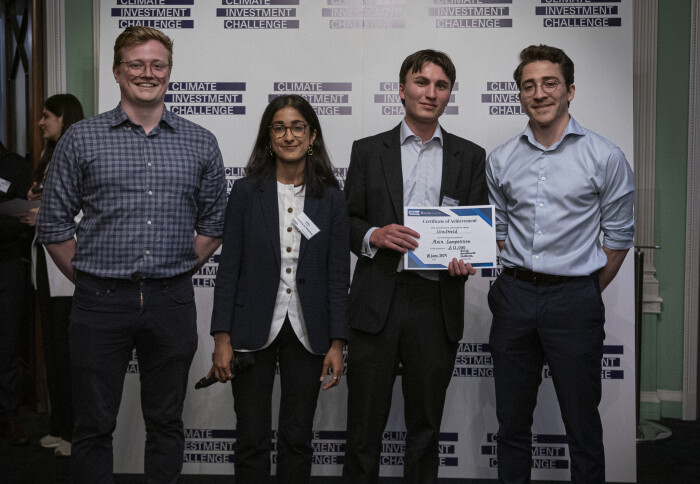Climate insurance idea wins top prize in Business School competition

The team from ClimShield who won this year's main prize
A team of Imperial students has won a £12,000 prize for a business idea that aims to provide better insurance for developing countries.
ClimShield aims to contribute to the $212 billion needed annually for adaptation finance by 2030 in developing countries, supporting global efforts toward climate resilience. The project, which was led by two students from Imperial’s MSc Climate Change, Management & Finance, won the top prize at the annual Climate Investment Challenge competition hosted by the Centre for Climate Finance & Investment at the Business School.
The business plan focuses on scaling parametric insurance using affordable premiums and blended finance strategies. It aims to create a fairer and more affordable insurance plan for countries that are most at risk of the impact of climate change and aims to make a positive contribution to the international climate finance ecosystem.
The students behind the project, Frederick Fabian and Freddie Stretch, met during their studies at the Business School.
Reacting to the news of his team’s win, Mr Fabian said: “Presenting ClimShield at the Climate Investment Challenge was an extraordinary opportunity to showcase our solution in the face of global climate challenges. It was great to hear the expert panel confirm the need for a solution like ClimShield, and winning the competition is a significant validation of our approach and vision."
FLOOD PROTECTION INSURANCE
Another team of Imperial students secured a £7,000 prize in the Data Analytics category.
ClimateSafe aims to help people whose properties are at risk from flooding by providing a "resilience-as-a-service" insurance package, which combines pre-emptive flood-resilience retrofits with insurance, for those at risk.
The project team comprised the following students: Aditya Pahade, Annika Langbein, Daniel Ortega, and Georgina Graham, who are all studying on the MSc Climate Change, Management & Finance.
Aditya Pahade said: “The win means a huge amount to us; we all strongly believe that this idea has the potential to help people from across society to protect their homes and livelihoods from the risk of flooding. We’re incredibly excited to get started on the journey to making this idea a reality.”
"The innovations proposed were all well researched and thoroughly developed and presented to a quality seen at VC level and beyond." Dalia Daou Director of the Centre for Climate Finance & Investment, Business School
The Climate Investment Challenge competition was created four years ago by the Centre for Climate Finance & Investment at the Business School. This year the competition received 128 applications from universities around the world. The competition invites teams of students to submit their innovative business ideas to combat climate change, with the finalists pitching their projects to a panel of industry experts. This year students competed for three different prizes, each worth up to £12,000.
Dalia Daou, Director of the Centre for Climate Finance & Investment said: “The level of the competition and the exceptional quality of the finalists was reflected in the commitment and engagement of the esteemed industry judges. The innovations proposed were all well researched and thoroughly developed and presented to a quality seen at VC level and beyond. They spanned solutions including financing island-based ocean carbon sequestration, locally enabling the reduction of agricultural food waste, and international flood insurance.”
The competition has expanded in scope this year, thanks to the efforts of the following Business School students who organised the event: Ewan Mackenzie-Smith, Huzefah Umer, Tessa Lagauzeire and Bailey Robertstad.
The Climate Investment Challenge competition was supported by the UK Centre for Greening Finance and Investment (CGFI), Ninety-One, Engie, Impax Asset Management, Howden and Candriam, alongside Quinbrook Infrastructure Partners and the Singapore Green Finance Centre.
Article text (excluding photos or graphics) © Imperial College London.
Photos and graphics subject to third party copyright used with permission or © Imperial College London.
Reporter
Laura Singleton
Communications Division